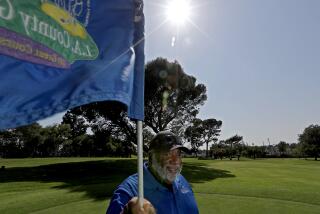Golf Can Be as Good for the Body as for the Soul
Some people think golf is just a pointless pastime for people who dress funny, chase little white balls and swear a lot. As a golf lover, I’m here to say, well, for the most part you’re right.
Except about the “pointless” part. After all, a recent study shows that playing a round of the ancient game is a surprisingly good form of exercise.
Finnish scientists gathered 110 men, ages 45 to 65. Half were golfers, while the others didn’t play golf or participate in any form of regular exercise. The non-golfers were told to go about their usual lifestyle, while the golfers were asked to make a grave sacrifice in the name of science: play two or three rounds per week for five months. The study stipulated that the golfers had to walk the course instead of puttering around in motorized carts.
At study’s end, the non-golfers’ vital statistics--weight, cholesterol levels, blood pressure--were pretty much the same as at the start. The golfers, however, showed some striking health improvements. They had lost an average of about three pounds and trimmed their waistlines by nearly an inch. All the golfers increased their levels of HDL cholesterol, the “good” kind. The golfing men who had hypertension experienced modest decreases in blood pressure.
*
Despite all the mystical stuff about golf in the movie “The Legend of Bagger Vance,” there’s nothing unique or special about golf itself, at least as far as your health is concerned. Swinging a club and lugging around a bag do burn a modest amount of calories, but the key to golf’s health benefits is all that walking. A typical course is anywhere from three to four miles long from the first tee to the 18th green. The typical player, including me, sprays shots in all directions, making for an even longer walk. The irony, of course, is that what’s bad for my handicap is good for my health.
The Finnish study, said Howard Sesso, an epidemiologist at Brigham and Women’s Hospital in Boston, “provides good preliminary evidence that moderate-intensity activities do appear to confer health benefits.”
Sofa jockeys, are you listening? About 60% of Americans don’t exercise regularly, which most experts agree has contributed to the skyrocketing rates of obesity and diseases such as adult-onset diabetes. To break the cycle of sloth, public health officials have encouraged Americans to incorporate exercise into our daily lives any way we can, whether by taking the stairs instead of the elevator or walking to the store instead of driving.
Some skeptics have questioned the value of so-called exercise lite, claiming that only vigorous (read: long and sweaty) workouts are good for the heart and other aspects of health. But Sesso, who wrote an editorial accompanying the Finnish study for the August issue of the American Journal of Medicine, says evidence for the benefits of moderate exercise is piling up.
That’s good news if you can’t or won’t commit to a regular program of intense exercise, such as jogging or swimming, but can see yourself playing a lot of golf, or taking a walk every night after dinner. “If we start to find legitimate benefits from these types of activities,” said Sesso, “that would enable us to prescribe physical activity in amounts that are much more attainable for people who are less active.”
Naturally, if you already exercise regularly, no one is suggesting that you throw out your running shoes and buy a set of irons. As Sesso notes, some evidence does suggest that more-intense exercise leads to better health. But if you’re now on the sidelines, getting moving with a moderate activity such as brisk walking or golf is a great start.
The latter is not for everyone, of course. Playing golf can be expensive, for one thing. Frustrating, too, as Mark Twain noted in his famous observation that the game is little more than “a good walk spoiled.” That may be, but the science shows that even a spoiled walk is better for your health than no walk at all.
*
Massachusetts freelance writer Timothy Gower is the author of “Staying at the Top of Your Game” (Avon Books, 1999). He can be reached at tgower@mediaone.net. The Healthy Man runs the second Monday of the month.
More to Read
Go beyond the scoreboard
Get the latest on L.A.'s teams in the daily Sports Report newsletter.
You may occasionally receive promotional content from the Los Angeles Times.










